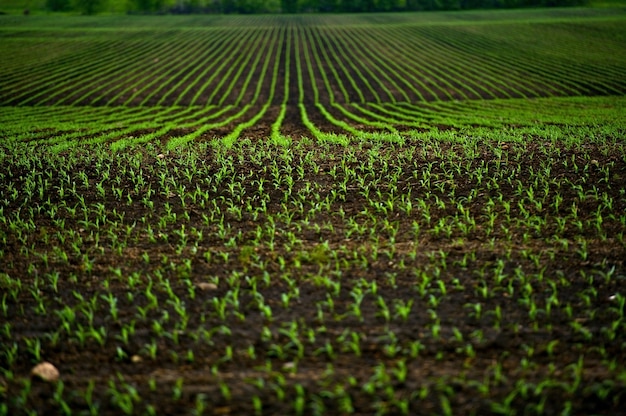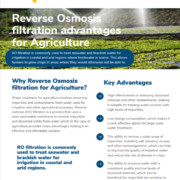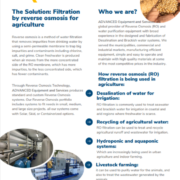Agricultural Water Filtration
Importance of Water Quality in Agriculture
Water quality plays a crucial role in agriculture, as it directly affects crop yield, livestock health, and the overall sustainability of farming operations. Poor water quality can lead to reduced crop yields, lower quality produce, and an increased risk of waterborne diseases in both humans and animals. Contaminated water can also have a detrimental impact on the environment, affecting aquatic ecosystems and wildlife habitats. Therefore, it is essential to ensure that irrigation water is free from harmful contaminants, such as suspended solids, bacteria, and viruses, to maintain optimal water quality. By prioritizing clean water, farmers can safeguard their crops, protect their livestock, and contribute to a healthier environment.
Reverse Osmosis & Water Filtration System For Agriculture
Water’s importance in agriculture cannot be emphasized, as it is this resource that propels food production. Water is essential not only for the development of crops, but also for the rearing of animals for the production of our meat products.
River water can be effectively filtered and reused in agricultural processes, making it suitable for irrigation, filling water troughs, and other agricultural applications.
Irrigation is a core activity in agriculture, thus its needs for treated water and ways to reuse water for this process. Therefore use of this water treatment applications could benefit the whole process:

Benefits of Advanced Agriculture Water Filtration Systems
Implementing effective agricultural water filtering techniques ensures a reliable and constant water source for farms, enhancing productivity and efficiency. Some of its key advantages include:
- Improved Crop Yield – Clean water promotes healthy development of plants, and thus, high yields and high-quality yields.
- Livestock Health & Well-Being – Purifies water by filtering out unhealthy microbes and impurities that can affect cattle welfare
- Sustainable Water Management – By conserving use of untreated sources, a less environmentally taxing agricultural practice is assured.
- Reduced Equipment Damage – Filtration prevents mineral buildup in irrigation systems, extending equipment lifespan and reducing maintenance costs.
- Compliance with Regulations – Meeting water quality standards helps farms comply with agricultural water safety guidelines.
Customizable Water Treatment Solutions for Agriculture
At ADVANCEES, we offer tailored agriculture water filtration solutions to meet the specific needs of different farming operations. Our systems can be designed for:
- Drip Irrigation & Sprinkler Systems – Eliminate stoppages and have even water distribution.
- Greenhouse & Hydroponic Farming – Provide perfect water purity for growing environments under controls.
- Dairy & Livestock Farms – Ensure safe and proper sanitation for animals.
- Aquaculture & Fisheries – Provide high-quality water for aquatic and fish farm use.
Our reverse osmosis (RO) technology, ion exchange, and high-tech filtering capabilities allow agricultural operations to use water with utmost efficiency and protect animals and produce.
Get the Right Agriculture Water Filtration System
Every farm is different and will have its specific water filtering requirements, and selecting a proper system is critical for efficiency and for long-term sustainability. Get in touch with ADVANCEES today and have your farm’s best agricultural water filtering system installed. Our professionals will assist in choosing, installing, and maintaining a system that will serve your agricultural objectives.


